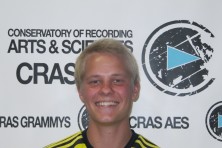Cyber Schooling
- Share
- Tweet
- Pin
- Share
For some Door County high school students, September means it’s time not only to get back to school, but also to get back to cyberspace.
“Last year we had a substantial increase in the number of students taking classes online,” says Robert Nickel, principal at Sturgeon Bay High School. “It was upwards of 70 students.”
Nickel says only 15 students are taking advantage of Sturgeon Bay’s online course options so far this semester, but he expects the number may change as semester schedules shift around.
“For some students it’s regular, required courses,” says Nickel, speaking about what classes students choose to take online. “For others it’s electives we don’t offer. There’s a variety of AP classes [and others such as] marine science, game design, Japanese, German.”
The increase in online course enrollment may have been prompted by Sturgeon Bay High School’s recent decision to allow online classes to count towards a student’s grade point average (GPA). Previously, students earned credit for online courses, but they didn’t count towards GPA.
Nickel says the quality of online courses has risen, and the school now feels comfortable including those courses in GPA calculations.
“It’s much better than it used to be,” he says. “It’s all done by licensed Wisconsin teachers now, and there’s a review process.”
Sturgeon Bay contracts with two vendors, Wisconsin Virtual School and Brigham Young University, to provide online classes for students. The classes cost the school between $128 and $250 per student, but Nickel says keeping students in the district more than mitigates the cost of the classes.
“There are online schools available, and students would’ve had to open enroll out and cease being a Sturgeon Bay High School student to use those,” he says. “We’re still benefitting greater from keeping the student and getting the government aid.”
Both Nickel and Chelsea Roberts, who works as a counselor at Gibraltar High School, say their schools’ online programs are part of an effort to get kids ready for the type of learning they’ll encounter in college.
“Lots of college classes are online now,” says Roberts. “So we’re making sure our students are college ready.”
Gibraltar requires its students take at least one semester of an online or Interactive Television (ITV) course before they can graduate. A study hall teacher supervises the online classes, while the ITV courses take place with an actual teacher who is broadcast into the classroom via television.
“If we feel the student will have a hard time online, we encourage them to take an ITV class because there’s still a teacher,” says Roberts. “They’re not there in front of them, but at least there’s a live teacher encouraging them.”
Students are currently taking 14 different online classes at Gibraltar, and 34 students are enrolled in ITV courses which broadcast from places like Sevastopol High School and NWTC.
At Sturgeon Bay High School, two students are enrolled in a Virtual Student Program that allows them to attend school without even setting foot in the building. The program is an option for students who have a tough time getting to school or have trouble sitting in the classroom all day.
“They’re kids that live in Sturgeon Bay, and they’re still considered our students,” says Nickel. “They can still participate in sports, clubs, and other activities.”
While the virtual students are still considered Sturgeon Bay High School students, they don’t earn a class rank and aren’t eligible to become valedictorian or salutatorian.
Nickel says the school doesn’t feel comfortable allowing students who don’t receive any grades from actual Sturgeon Bay High School teachers – and may not even enter the building during their four years of high school – to possibly be named valedictorian.
The program hasn’t been around long enough yet for a student to complete their entire high school career as a virtual student, but one student has been in the program for two and a half years.
Nickel, who has himself taken some online courses, says he thinks many students find the online courses more challenging than regular courses for several reasons, including the need for self-motivation and the lack of classroom interaction.
“I don’t think you can duplicate what’s going on in a classroom in a virtual setting. There’s no relationship built into a virtual setting,” he says. “Really, for me, I’d rather be in the classroom with other people.”
Roberts says Gibraltar’s program is working and will likely stay the way it is for awhile.
“I don’t see it changing a lot because kids can tell me what they want, and I can find it,” she says. “We’re not replacing teachers.”


